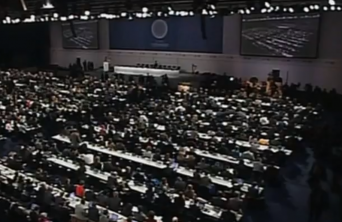Climate Talks Begin In South Africa
Several thousand delegates from 194 countries have traveled to Durban, South Africa to discuss climate change initiatives and debate the extension of the Kyoto Protocol.
The United Nations Climate Change Conference, or COP17, opened with a keynote address by Jacob Zuma, president of South Africa. After discussing the droughts and perceptible climate change seen in Africa, he urged his fellow world leaders to remove politics from their decisions.
"For most people in the developing world and Africa, climate change is a matter of life and death," he said, according to the Associated Press. "Change and solutions are always possible. In these talks, state parties will need to look beyond their national interests to find a global solution for a common good and benefit of all humanity."
Issues at hand
The conference, which will run until Dec. 9, has announced two main goals: the extension of the 1997's Kyoto Protocol and the funding of climate change initiatives in poor countries.
Under the current Kyoto Protocol, some of the world's biggest greenhouse gas emitters -- such as China and India -- are not required to curb emissions due to their status as developing nations. This caused major conflict at the Kyoto Protocol's inception and served as a reason why the United States did not become party to the agreement.
Canada, Japan, Russia and other countries have announced they will not sign any new agreements unless all major emitters are included.
Canadian Environment Minister Peter Kent told Bloomberg the 1997 agreement "is the past" and he will work with other countries only to make an equally binding agreement.
"We will not make a second commitment to Kyoto," he said.
The delegates of COP17 are also set to debate the Green Climate Fund, which would give around $100 billion in funds annually to developing nations for the purpose of preparing their infrastructures against the effects of climate change. This proposal originated at the 2009 conference but has since been left unfunded.
Todd Stern, who serves as the United States' special envoy for climate change, said although the Kyoto Protocol is "not on the table" the U.S. is considering support for the "problematic" Green Climate Fund.
"We have been quite focused on it since the beginning," he told BusinessDay. "The U.S. is a strong supporter of the basic concept, and we are optimistic that an agreement on the final details of the mechanism can be reached in Durban."
Results or rhetoric?
Some worry these debates will focus on only politics without considering the "life and death" effects attributed to climate change. Many environmental groups have submitted proposals pleading with delegates to consider the vanishing rain forests, destruction of farmland, unusual natural disasters and other physical issues affecting millions worldwide.
Rajendra K. Pachauri, director of the Intergovernmental Panel on Climate Change, told The New York Times he was worried the conference would "only focus on short-term political considerations" instead of discussing scientific findings.
“I feel we are losing completely the scientific rationale for action,” he said.
Pointing to the failed carbon emission cap debates of COP15, Al-Jazeera says many consider the decisions at these conferences as "tactics that stall a solution."
WATCH:






